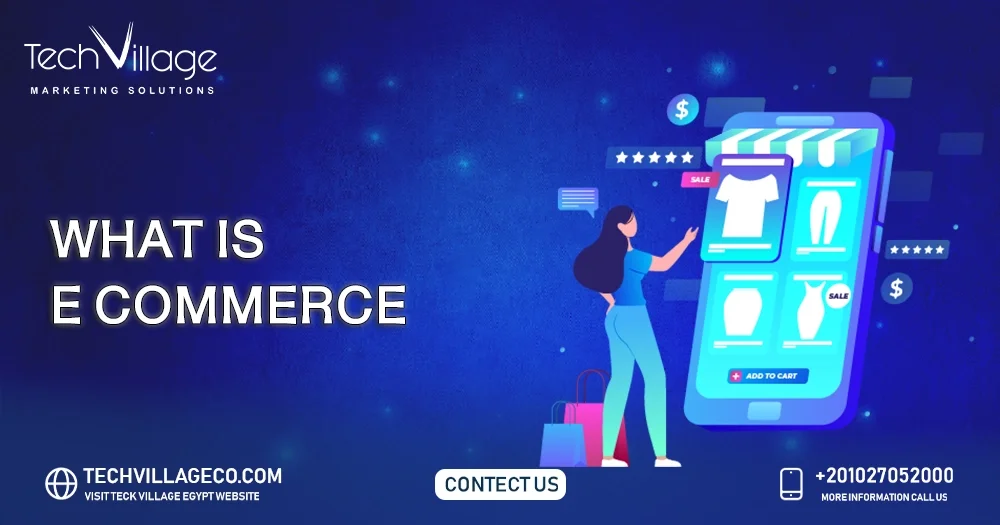What is e commerce? E-commerce commerce, is the term used to describe the purchasing and selling of goods and services via the internet. Retail shopping, banking, investing, renting, and other online business activities for goods and services are all included in this broad category.
E-commerce has transformed the traditional shopping experience by allowing consumers to browse, compare, and purchase products and services from the comfort of their homes. This digital marketplace operates through various platforms such as online retail websites, marketplaces, and social media. So in the following lines we will discuss What is e commerce?
Table of Contents
ToggleWhat is e commerce?
What is e commerce? E-commerce, encompasses a variety of business transactions conducted online, such as retail shopping, auctions, banking, and rentals.
E-commerce platforms enable consumers and businesses to interact and transact without the need for physical presence, offering convenience, a wide range of products, competitive pricing, and access to global markets. The rise of e-commerce has significantly impacted traditional retail and service industries, making online shopping a vital part of the global economy.
Get to know: What Is Google Trends In Digital Marketing.
How are online sales conducted?
In addition What is e commerce?
Online sales are conducted through a series of steps involving both the buyer and the seller. Here’s guid about the process of online sales:
- Product Listing: Sellers list their products or services on an e-commerce platform or their own website. Listings typically include product descriptions, prices, images, and other relevant details.
- Search and Discovery: Buyers search for products using search engines, e-commerce platforms, or social media. They can browse categories, use filters, and compare products.
- Selection and Cart: Once buyers find the desired products, they add them to a virtual shopping cart. This allows them to continue shopping and select multiple items.
- Checkout Process: Buyers proceed to checkout, where they review their selected items, enter shipping information, and choose payment methods. E-commerce platforms often provide various payment options, including credit/debit cards, digital wallets, and bank transfers.
- Payment Processing: What is e commerce? The e-commerce platform processes the payment through secure payment gateways, ensuring the transaction is safe and encrypted.
- Order Confirmation: After the payment is successfully processed, buyers receive an order confirmation via email or SMS. This confirmation typically includes order details, estimated delivery time, and a receipt.
- Order Fulfillment: Sellers prepare the order for shipment. This involves packaging the products and arranging for delivery through shipping carriers.
- Shipping and Delivery: The order is shipped to the buyer’s specified address. Buyers can often track their orders using tracking numbers provided by the shipping carrier.
- Delivery Confirmation: Once the order is delivered, buyers receive a delivery confirmation. Some platforms allow buyers to confirm receipt of the order online.
- Customer Support and Returns: If buyers encounter any issues or wish to return products, they can contact customer support. E-commerce platforms typically have return and refund policies to handle such cases.
- Feedback and Reviews: After receiving the products, buyers can leave feedback and reviews, helping future customers make informed decisions.
Read also: Best Digital Marketing Agency In Cairo.
How And Where Is E-commerce Conducted?
What is e commerce? E-commerce is conducted on a variety of platforms and through several channels, utilizing the internet to facilitate transactions between buyers and sellers. Here are the primary methods and places where e-commerce occurs according to tech village:
1. Online Marketplaces:
- Amazon: One of the largest e-commerce platforms where third-party sellers and Amazon itself offer a wide range of products.
- eBay: An auction and shopping website where individuals and businesses buy and sell various goods and services.
2. Retailer Websites:
- Direct-to-Consumer (D2C): Brands like Nike, Apple, and others sell directly to consumers through their websites.
- Multichannel Retailers: Traditional retailers like Walmart and Target, which also have robust online stores.
3. Specialized E-commerce Sites:
- Niche Markets: Websites focused on specific product categories, such as Zappos for shoes or Wayfair for furniture.
- Subscription Services: Platforms like Netflix for streaming or Dollar Shave Club for monthly deliveries of grooming products.
4. Social Media Platforms:
- Instagram: Shoppable posts and ads allowing users to purchase directly from their feed.
- Facebook Marketplace: A place where users can buy and sell within their local community.
- TikTok: Integrated e-commerce features allowing brands to sell products directly through the app.
5. Mobile Apps:
- Dedicated Apps: Many e-commerce platforms have their own apps, providing a seamless shopping experience.
- In-App Purchases: Games and apps offering additional content or features for sale within the app itself.
Get to know: What Is Google Trends In Digital Marketing.
What are the three types of e-commerce?
Speaking about What is e commerce? The 3 main types of e-commerce are:
1. Business-to-Consumer (B2C):
- Description: This is the most common form of e-commerce, where businesses sell products or services directly to consumers.
- Examples: Online retailers like Amazon, Walmart, and eBay. Websites for brands like Nike or Apple also fall into this category.
- Characteristics: Focus on user experience, ease of navigation, secure payment methods, and customer service. Marketing strategies often include SEO, social media marketing, and email campaigns.
2. Business-To-Business (B2B):
- Description: What is e commerce? In B2B e-commerce, transactions occur between businesses.
- Examples: Alibaba, ThomasNet, and industry-specific platforms like Bulkbookstore.com for wholesale book purchases.
- Characteristics: Emphasis on large quantities, bulk pricing, long-term contracts, and often more complex negotiations. Relationships and personalized service are key, along with efficient supply chain management.
3. Consumer-To-Consumer (C2C):
- Description: This type of e-commerce involves consumers selling directly to other consumers, often facilitated by a third-party platform.
- Examples: eBay, Craigslist, and platforms like Facebook Marketplace and Etsy for handmade and vintage items.
- Characteristics: Typically involves auctions or peer-to-peer sales. The platform usually provides tools for listing items, secure payment processing, and sometimes dispute resolution. User-generated content and reviews play a significant role in building trust.
Read also: Ecommerce Website Dubai.
What Are The Benefits Of E-commerce
What is e commerce? The following are some of e-commerce’s main benefits:
1. Global Reach:
- E-commerce allows businesses to reach customers around the world, breaking geographical barriers and expanding their market presence.
2. Lower Operating Costs:
- Online stores can reduce the costs associated with physical storefronts, such as rent, utilities, and in-store staff.
3. Personalized Marketing:
- Businesses can use data analytics to tailor marketing efforts to individual customers, offering personalized recommendations and promotions.
Here’s: The Important Of Automotive Digital Marketing Strategy
4. Scalability:
- E-commerce platforms can easily scale to handle increased demand during peak times, such as holidays or sales events.
5. Improved Inventory Management:
- Automated inventory management systems help businesses track stock levels, reduce overstock and stockouts, and streamline operations.
Conclusion
In conclusion, What is e commerce? e-commerce represents a significant shift in how businesses and consumers interact, driven by the convenience and accessibility of the internet. It has revolutionized traditional commerce by providing a platform for a global marketplace, where transactions can be completed swiftly and efficiently.
The continuous evolution of e-commerce, fueled by technological advancements and changing consumer preferences, highlights its critical role in the modern economy. As it continues to grow, e-commerce will likely further reshape industries, enhance customer experiences, and create new opportunities for innovation and business expansion.
FAQ
Is Amazon E-commerce?
Yes, Amazon is a major e-commerce platform. It allows customers to buy a wide range of products online, including electronics, clothing, books, and more. Additionally, Amazon provides services for third-party sellers to list and sell their products through its website.
Is Netflix An E-commerce?
Netflix is not cosidered an e-commerce platform. Instead, it is a streaming service that offers a subscription-based model for accessing a vast library of movies, TV shows, documentaries, and original content. While e-commerce involves buying and selling physical or digital goods online, Netflix primarily provides access to streaming media content.

 AR
AR




